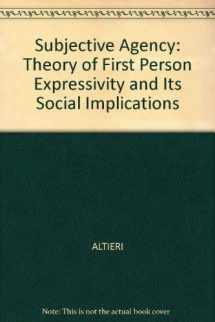
Subjective Agency: A Theory of First-Person Expressivity and Its Social Implications
ISBN-13:
9781557861290
ISBN-10:
1557861293
Edition:
First Edition
Author:
Charles Altieri
Publication date:
1994
Publisher:
Blackwell Pub
Format:
Hardcover
306 pages
FREE US shipping
Book details
ISBN-13:
9781557861290
ISBN-10:
1557861293
Edition:
First Edition
Author:
Charles Altieri
Publication date:
1994
Publisher:
Blackwell Pub
Format:
Hardcover
306 pages
Summary
Subjective Agency: A Theory of First-Person Expressivity and Its Social Implications (ISBN-13: 9781557861290 and ISBN-10: 1557861293), written by authors
Charles Altieri, was published by Blackwell Pub in 1994.
With an overall rating of 4.4 stars, it's a notable title among other
books. You can easily purchase or rent Subjective Agency: A Theory of First-Person Expressivity and Its Social Implications (Hardcover) from BooksRun,
along with many other new and used
books
and textbooks.
And, if you're looking to sell your copy, our current buyback offer is $0.51.
Description
In this book, Altieri argues that subjective agency cannot be satisfactorily accomplished within the modes of thought now dominating the humanities: literary criticism and cultural studies remain trapped in binaries shaped by post-structural theory, and Anglo-American ethics is not sufficiently responsive to the challenges that theory poses to its assumptions about interests, judgment and public responsibility. So he turns, instead, to the expressivist tradition in philosophy best represented by Spinoza and Hegel. But rather than rely directly on its languages for substance and for self-articulation, he shows how one can secure those ideas on the basis of Wittgenstein's work on intentionality. In so doing, Altieri works through the most influential contemporary accounts of ethical agency - by Charles Taylor, Bernard Williams and Stanley Cavell - in order to argue that a version of expressivist interests based on Kant's aesthetics offers the most promising path. Finally, he spells out the connections between expressivist ethics and liberal politics, using those connections to defend liberalism against communitarian positions.


We would LOVE it if you could help us and other readers by reviewing the book
Book review

Congratulations! We have received your book review.
{user}
{createdAt}
by {truncated_author}


